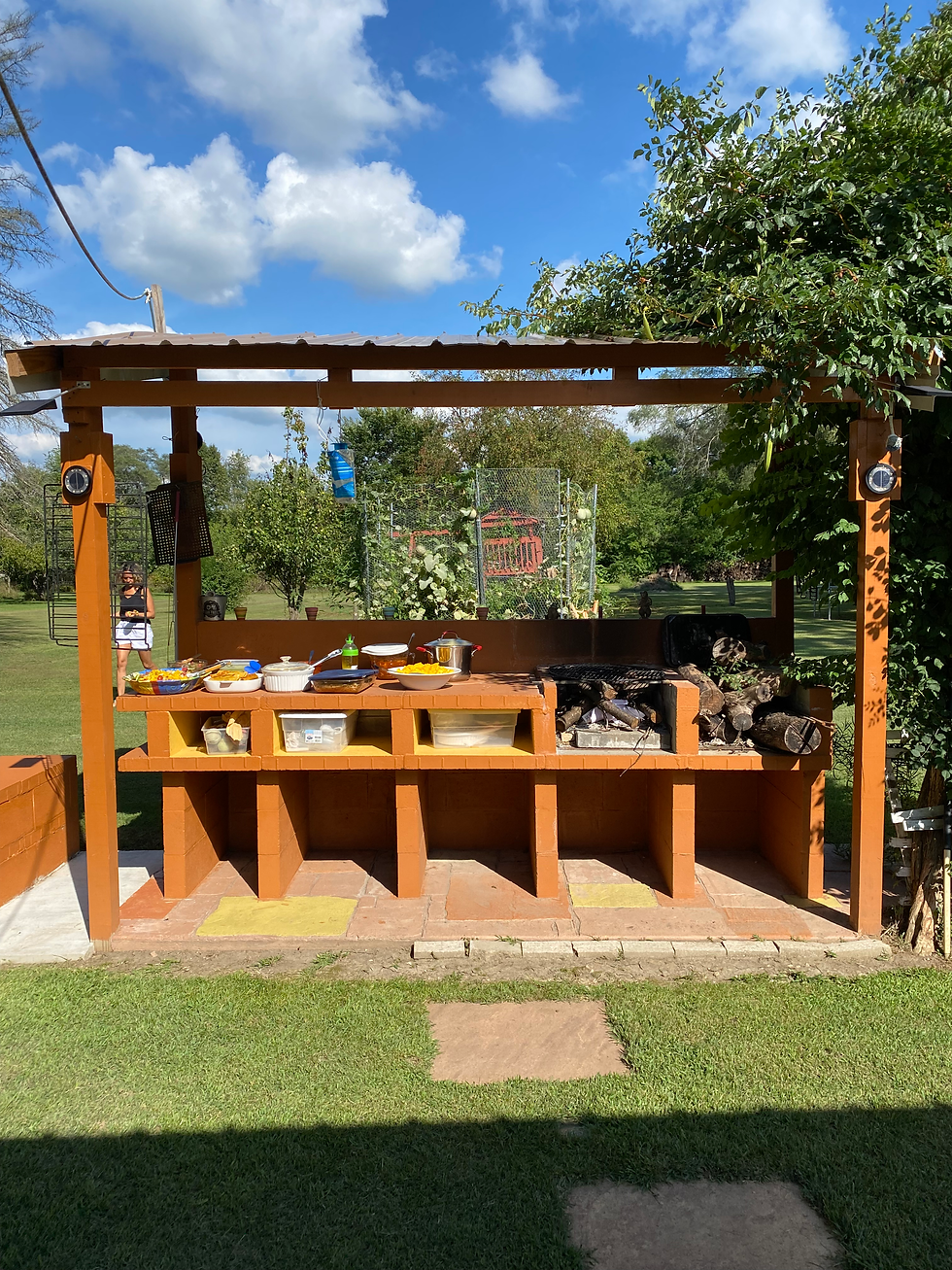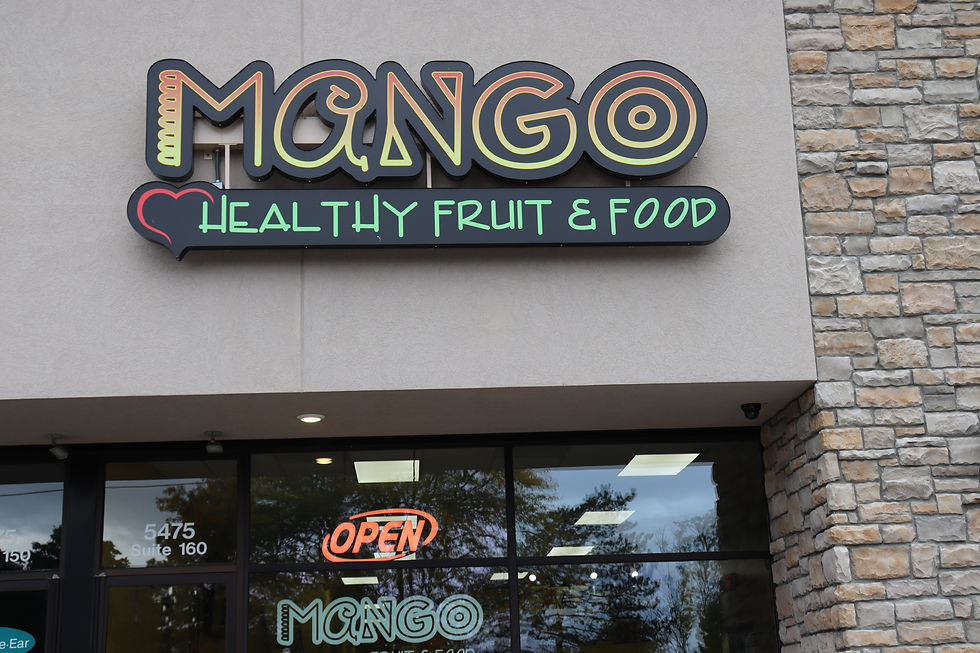Mango & Migration: Mexican Foodways in Battle Creek
- Santos Ramos

- Oct 12, 2022
- 6 min read
By Alberto Guerrero & Santos Ramos

Introduction – by Santos Ramos
This article was grown out of Making Mexican History in Battle Creek, a community project highlighting the local history and ongoing presence of Mexican communities. Alberto Guerrero, co-owner of Mango Healthy Fruit and Food, served as a Project Leader to help facilitate this work. Throughout our time together on the project, we had many conversations about the state of Mexican food locally. Both formally through interviews and informally at social gatherings, we spoke with community members about their heritage foods, as well as their concerns with the impact today’s food system is having on people’s health and sense of cultural identity. We share some of these insights here by focusing on Alberto’s story and the philosophy behind Mango.
First, it is important to understand that Mexico and the United States are deeply interconnected through their food systems. As is the case with my own family, many Mexican and Latine people come to Michigan (and to Battle Creek specifically) as migrant farmworkers harvesting crops. Additionally, trade and immigration policies adopted by one country inevitably shape the lives of people in both countries. As Alberto himself writes,
After the economic crisis of 1994, the Mexican government decided to import much more of their crops, corn, beans, wheat etc., leading to the abandonment of land cultivation, the sowing of grains & planting the land, leaving many farmers out of jobs. In addition, the excessive privatization of national companies and natural resources caused a massive migration of Mexicans to the cities of the US.
Taking effect in 1994, the North American Free Trade Agreement (NAFTA) greatly benefited large US agricultural corporations and made it impossible for small-scale Mexican farmers to compete in producing their own cultural foods. Researchers estimate the policy displaced tens of millions of Mexican people and caused 10 million Mexicans to migrate to the United States over the subsequent decade. There are countless varieties of corn in Mexico specific to the cultural identities of particular regions and communities. Policies like NAFTA also have the impact of destroying biodiversity and forcing the mass production of a singular corn variety without much nutritional or cultural value. This is a trend we see throughout the dominant food system in the US, which sacrifices health and culture for convenience and profit. This is why it is important to have businesses like Mango who operate with these things in mind.

My Family’s Story—by Alberto Guerrero
In 1994, I finished my bachelor’s degree in Business Relations and graduated from the Superior School of Commerce and Administration (IPN) in Mexico DF. I was working in a good company when I met my wife, who had lived in Michigan for years. In previous years, she was brought by her father to Michigan to work in the fields along with her brothers. When we got married a couple of years after we met, she suggested that I should get my visa and that we may come to Michigan where some of her brothers still lived and we could visit them.
Alberto Guerrero, Co-Owner of Mango When I arrived in Battle Creek, I told my wife, life here is very slow and very easy. I came from a chaotic, immense and complicated city. That is why it was not difficult to adapt. I greatly admire my Mexican people because they work hard to send money to their relatives in Mexico. One of the things I miss the most is family, even though we try to visit them in Mexico once a year, there is never enough time for those family moments.
It is worth mentioning that I come from a united family, where my mother cooked every day. There was a great variety in the dishes that she cooked. Vegetables, beans, rice and chicken dishes were never lacking. There was never an excess of red meat. It was very expensive to be buying often. Despite the fact that in those times we never thought about calories or the nutritional value of food, nor about fat, nor about the harmfulness of red meat; unconsciously my parents brought home good supplies, in order to prepare the delicious and fresh dishes of each day.
In those times, the groceries were bought day by day. There was no money for more. It is not like now where you buy your food for one or two weeks. When I lived in Mexico City, like in Battle Creek, there were plenty of places to eat tacos, tortas, and many Mexican snacks which are delicious. However, it is not healthy to eat that every day. It is important to have a food discipline to be able to decide correctly.
Arriving at Battle creek, I discovered that there was everything necessary to cook Mexican food. There were Mexican stores, and even in stores like Walmart or Mejier, you can find a wide variety of Mexican products and condiments. Unfortunately, many times we adopt the lifestyle of the majority. We live in a world in a hurry, where everyone in the house works regularly and there is no time to cook. This increases the consumption of fast food, junk food, canned food or food ready to be heated in the microwave.
Due to the aforementioned, we promote health, and a good option for those who eat out or have a snack, is in Mango restaurant where you can not only eat and fill up, you also nourish your body. When someone needs it, we are open to listen and give good health and wellness advice, or for an eating disorder; we can share the little knowledge we have with them and try to find solutions.

The Mango Philosophy—by Alberto Guerrero
Inside the Mango location 5475 Beckley Rd. Our philosophy is to help people achieve a healthier & balanced diet, healthy organs, peaceful hearts and stronger bodies! And share Mango's profits with those in need. We have salads, bowls, quesadillas, wraps, stuffed avocados, romaine wraps, breakfasts with organic eggs, smoothies, juices, fruit salads, etc. The menu is extensive because we want to have food for all kinds of tastes and customer needs, and have a variety of flavors since we have a fairly varied community in tastes.
Before opening Mango, my wife and I noticed that we were being bombarded with fast food and junk food options for ourselves and our children. We quickly realized the damage these foods and products were doing to our family’s health: filled with refined sugars, bad carbs, conservatives, artificial flavorings, colorants and a variety of other harmful ingredients. These foods often cause diseases and health issues for many people in our community and in all the world. That’s when we knew that our community and children deserved food with vitamins, protein, minerals, and good carbs. That’s how we created Mango! We serve 100% natural and fresh products. We peel fruits every day to make our smoothies, and we wash / disinfect veggies on a daily basis to make in our food. We are a unique restaurant because we care about our customers.
We named our restaurant Mango because my whole family likes Mango very much. It’s a beautiful fruit that is very easy to incorporate with other fruits, drinks and foods, and is rich in nutritional properties. When we opened the Mango restaurant, many people did not know the mango fruit. Now it is very popular. In Mexico, everybody loves mango fruit. People like to eat it with hot pepper, or they make mango water. Nowadays, some food places there make salsa with mango.
At Mango, our chicken and turkey have no growth hormones or antibiotics, because we are committed to contributing to the health of our customers. We are providing food that could pass as homemade, that avoid fats, syrups, red meat, etc. Mango is characterized by having Mexican food with a healthy twist, by making food with vegetables, and drinks made with fresh fruits. We also have food for all kinds of people: vegetarians, vegans, zero carb meals, gluten-free, and more.
It is worth mentioning that Mexico is a very large country, with a lot of culture and a great variety in its gastronomy from north to south of the country. It’s also hard to forget family values, with very strong family love and warmth that no matter the distance. The relationship and the warmth and affection for our family remains strong.
Reflection—by Santos Ramos
Through conversations with community members, Alberto and I heard many concerns about the negative health implications of today’s food system that relies on processed foods high in sodium. In our first conversation together, I remember speaking with Alberto about how traditional Mexican recipes tend to be extremely healthy, but the corporate industrialization of agriculture both in Mexico and the US has changed the way we grow and cook our foods.
Changing our food system at a structural level will be a collective effort, and it requires us to understand Mexican foods in our local context within Battle Creek and across Michigan. Where and how are our ingredients produced? What are the policies shaping this production? How do we support the rights of farmworkers? How do we increase access to traditional knowledge about agriculture and cooking? How do we support body positivity within the food movement? These are some of the questions we will need to continue exploring and organizing around.
Please join our mailing list so we can communicate with you as we develop programming around these issues!
And thank you to sponsors who have helped bring our work to fruition: W.K. Kellogg Foundation, Grand Valley State University, Hispanic/Latino Commission of Michigan, and the Grand Rapids Community Foundation. The Spanish translation was done by Alberto Guerrero.






















Comments